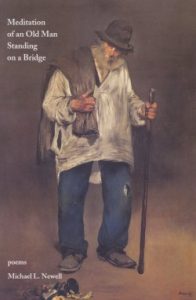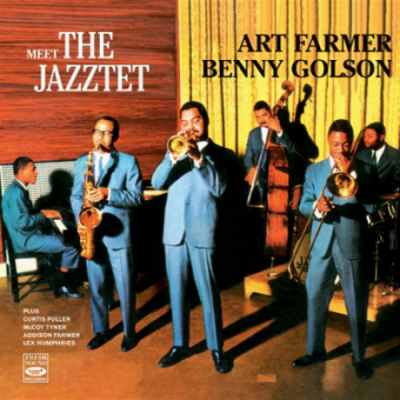_____
I am always happy to report when a writer published on Jerry Jazz Musician finds success with their work. Michael L. Newell informs me that a new book of his poetry, “Meditation of an Old Man Standing on a Bridge,” is now available from Seattle’s Bellowing Ark Press. This is particularly rewarding as I have proudly published many of the poems Michael has submitted to me since 2015 – two of which appear in this collection.
Michael’s poetry is a gift to those of us who love and appreciate the culture inspired by jazz music. His creative spirit is aligned with those musicians he writes about, maintaining a sensitivity critical to communicating the music’s cultural aesthetic.
Whenever I receive submissions from Michael, I know I will be reading the poetry of a well-traveled man whose work can lead me anywhere – a rainy window in Kigali, a snowy stroll in Tashkent, a Christmas spent alone in Jordan, a puzzling evening in London, an early morning accompanied by Bill Evans’ “Peace Piece,” or contemplating our collective soul along an open highway. His work offers brilliant and sensitive observations of giants like Bird, Monk, Miles, Brubeck, Coltrane and Evans, but also of the Preservation Hall Jazz Band, Horace Silver, Illinois Jacquet and Junior Mance. These artists become subjects of Michael’s experience, intelligence, curiosity, joy…
The writer Robert Wexelblatt writes of Michael; “He is an alchemical poet, universalizing the personal, industriously transmuting observation into feeling, experience into inexhaustible verse.” In an example of this gift – particularly of “transmuting observation into feeling,” I leave you with one of my favorite Michael L. Newell poems:
Her voice shredded, turned to gravel
by cigarettes and whiskey, she navigates
grocery aisles and checkout lines
as sotto voce she sings old songs
both jazz and country. People stare
in amazement as her ruined voice
elicits tears from listening bystanders.
In her living room she croons with records
of Billie Holiday, Peggy Lee, and Patsy Cline.
If you ask her, she will tell you that she used
to sing in bars and an occasional night club,
but no one will hire her any more
because she got into too damned many fights
with customers, bartenders, and piano players.
Damn the booze she will mutter, but then
she’ll tell any listener that she loves whiskey
better than any man, any place, anything
except music. And she will launch into
an old blues tune from the thirties
and slow dance round the room, glass
in hand, oblivious to one and all.
_____
Michael L. Newell is a retired English/Theatre teacher who has spent one-third of his life abroad. He now lives on the Oregon coast. In addition to his new book, he has recently had poems published in Verse-Virtual and Current.
Click here to access all of Michael L. Newell’s poetry published on Jerry Jazz Musician
To order a copy of the book, contact BELLOWING ARK PRESS 18040 7th Avenue NE Shoreline, WA 98155

*
Critical acclaim for Michael L. Newell’s work
“The narrow gap between Michael L. Newell’s poems and his cosmopolitan life is where the magic is. He is an alchemical poet, universalizing the personal, industriously transmuting observation into feeling, experience into inexhaustible verse. Ever on the move, Newell’s work records his walks through a wide world, from the Andes to the Arabian desert, from Baltic cities to Rwandan lanes. He is in the Celtic tradition but unmistakably American—funny, mordant, lyrical, and valedictory by turns, a jazz aficionado keenly sensitive to sadness yet apt to break into a sudden jig. His poetry can snare a moment, a place, or a mood in images that make you feel what it is to be completely alert and intensely alive.”
— Robert Wexelblatt, author of Zublinka Among Women, Heiberg’s Twitch, etc.
“Alive with presence, Michael L. Newell’s poetry brings the reader into the arms of the world in its myriad forms. Rain, the rush of wind, taste of blackberries, a guitar strumming in the distance—to read these poems is to experience a world awakened to the senses, to “creation’s mighty dance/in all its manifold forms.” The poems in this volume unfold with masterful pacing, use of white space and line breaks. Precise word choice and rich, moving detail in poems such as “A Somber Beauty,” and “Concert,” guide the reader into a deep well of inner silence where we touch beauty and know we are transformed. Flowing with music, laughter, and nature’s wild wonder, Mr. Newell writes in full awareness we will all disappear through a “…shadowy door/ which has been waiting for years,” a quality that gives his poems depth and makes reading them all the more powerful. If you’re longing for poems that will lift you from a hunched over life and bring you into life’s vast dance streaming with wonder and mystery, these are poems you will want to read and read again.”
—Anna Citrino, author of Saudade
“Michael L. Newell shows his skill and craftsmanship in his latest collection of poetry, a rich journey into the mind and words of the poet. Newell’s work has the rare ability to allow readers to enter the poem and experience place and sensations for themselves. Showing us the natural world, he expresses wonder and sorrow, joy and grief, willing to allow the world to be observed and lived in to the fullest. Reading these poems, I see and feel movement whether it is the brush of wind among the trees, the swaying of dancing bodies, or the delicate turn of a butterfly wings. Throughout the poems, too, we hear music: a voice in song, musical instruments, water, wind— as he says in one of the poems: “a great liquid tapestry.” These are poems to be read again and again, savored, and experienced.”
— Michael Minassian, author of The Arboriculturist and Around the Bend.
“At the heart of Michael L. Newell’s work lives music. He writes from Bolivia, from Rwanda, from Saudi Arabia, from Jordan and it’s all backdrop to the music in his head. Sharp-eyed, possessed of this music, he knows how to find home wherever he is. He bears witness to the people that surround him, to culture, to a land’s trouble and pain, yet, it’s the music that feeds him. He bears witness.”
—Stellasue Lee, Ph. D. Author/Editor/Teacher

































congrats, Michael. The posted poem was wonderful
Well done, Michael
Well done, Michael